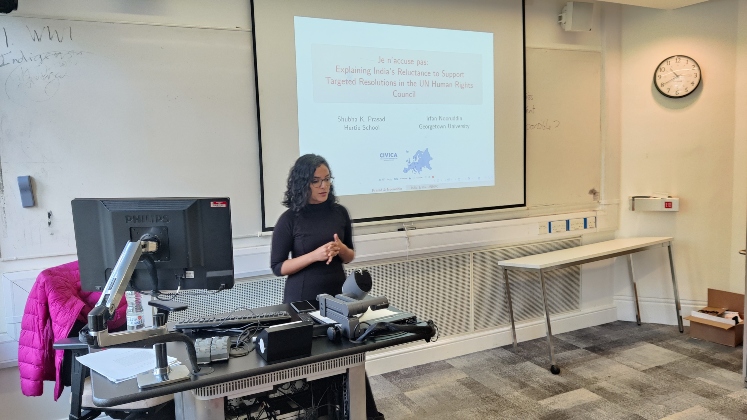 Last term Prof. Shuba Kamala Prasad spent time with faculty and students from the department of International Relations as part of the CIVICA short visit programme. See how she made the most of this experience and what opportunities it offered to our faculty and students. ↓
Last term Prof. Shuba Kamala Prasad spent time with faculty and students from the department of International Relations as part of the CIVICA short visit programme. See how she made the most of this experience and what opportunities it offered to our faculty and students. ↓
Why did you want to come to LSE and what did you work on during your visit?
The LSE is a hub of international political thought, so it’s always exciting to meet other academics in such an environment. I particularly wanted to visit the LSE for building networks with scholars like Dr. Rohan Mukherjee, meet PhD students and fellows, and present my own research work. The feedback I received for the work I presented was excellent!
Could you tell us a bit more about how this visit fits with the rest of your research?
My research on India’s voting habits in the UN Human Rights Council, which I presented at the LSE, is a part of my larger research agenda on examining the role of insurgencies and foreign policy outcomes. Given Dr. Mukherjee’s expertise on India’s role in the UN, it was a fruitful exchange of ideas.
What attracted you to this area of research?
In political science, we know a lot about how inter-state conflicts interact with foreign policy outcomes. However, research on examining the role of intra-state conflict on foreign policy outcomes has grown rapidly as a field only recently. It is important to investigate how issues of national security at the domestic level constrain states’ foreign policy ambitions. Such research has both academic and policy value.
How do you hope your research and work will contribute to a better society?
I hope that my research can help show how unresolved internal conflicts have negative repercussions in the long-term on a state’s foreign policy choices. Moving towards a world with more peaceful resolutions of conflict and improved human rights conditions is the goal to pursue.
What is your main take away from your time at LSE?
I thoroughly enjoyed the South Asia expertise I encountered at the LSE, which was particularly useful for my research on Indian foreign policy. Looking forward, I am exciting about continuing my collaboration with scholars at the LSE.
Do you have any advice for people who are thinking about applying but haven’t done so yet?
I highly recommend applying for it! You can pack in a lot of interactions and academic conversations in a span of a few days. It was a pleasure to be able to concentrate on the topics of my choice while testing my ideas in an academic environment outside of my own university. Fostering such academic exchanges only strengthens one’s theoretical output.
I would especially like to thank Dr. Rohan Mukherjee for being an excellent host and welcoming me to the LSE! He brought together a great crew for my talk and provided thought-provoking feedback. I look forward to further collaborating with him in the future on issues of overlapping interest.
Dr Rohan Mukherjee, LSE IDEAS’ Deputy Director shares his views on hosting Dr Prasad and the CIVICA short visit programme. His research focuses on the grand strategies of rising powers and their impact on international security and order with an empirical specialization in the Asia-Pacific region.
How did your collaboration come about?
Dr Prasad and I have met at academic gatherings in the past such as the annual British International Studies Association meeting in Glasgow last year, and we have always enjoyed exchanging ideas about Indian foreign policy, especially toward international institutions such as the United Nations. We thought it would be great to engage on a substantive piece of work that she is developing on India’s voting record at the UN Human Rights Council.
What do you expect this visit will lead to? (In terms of progress, new ideas, output, etc.)
I expect that the intellectual feedback provided by members of the LSE intellectual community will help Dr Prasad refine her already excellent research. The discussion over her research paper also gave the both of us new ideas about how to think about the causes behind India’s voting behaviour at the UNHRC and India’s approach to international institutions and order writ large.
What opportunities were offered to IR students and staff as part of this visit?
IR students and staff were invited to attend Dr Prasad’s talk, which they did, of course. In addition, Dr Prasad kindly agreed to hold meetings with individual PhD students and LSE Fellows in the IR department who might share similar research interests. She had a number of meetings of this nature, which were undoubtedly fruitful for those who met her.
How did this visit benefit your project as well as the department and its students? What is your main take away?
The IR department has done a great deal to diversify the regional focus of its faculty expertise and courses in the last few years. Dr Prasad's visit contributed to the work now being done in the department and more broadly at LSE on the international relations of South Asia. Her talk and visit were a valuable demonstration to the LSE community of what cutting-edge research by a prominent junior IR scholar of the region looks like, and was very inspiring in that regard.
I am very grateful to the CIVICA network and to LSE and the Hertie School for facilitating this visit. I hope we can maintain and even grow these types of exchanges going forward.
Read about Dr. Mili Lake's visit to Hertie here and do check our webpage for the next call for short visits.